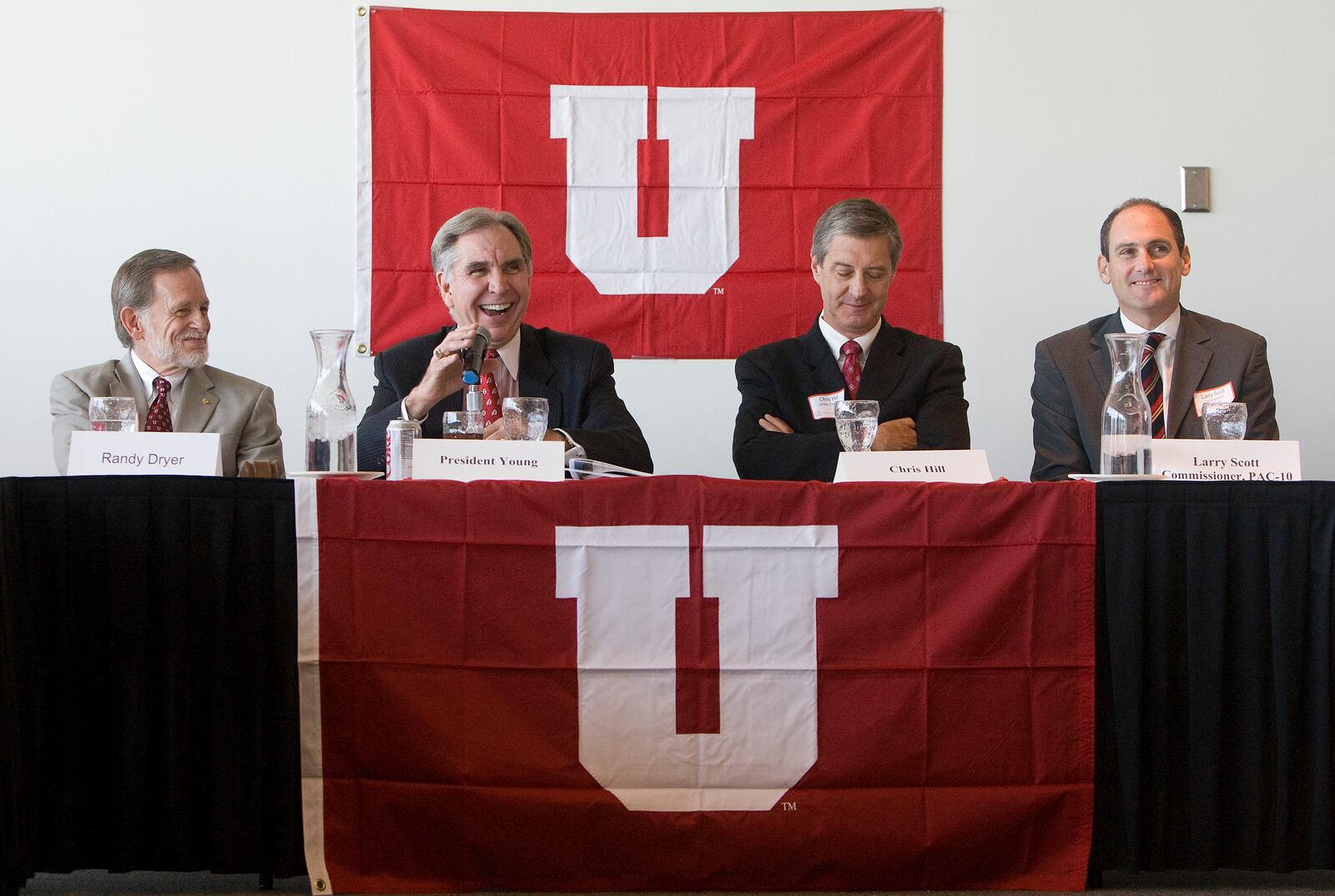SALT LAKE CITY — Considering a decade is 10 years long — who said journalists can’t do math? — it’s interesting that the most influential sports moments of the 2010s in Utah happened within a relatively short period in the early portion of that time frame.
Remember when a gruff and gritty, blue-collar workhorse used to coach the Utah Jazz?
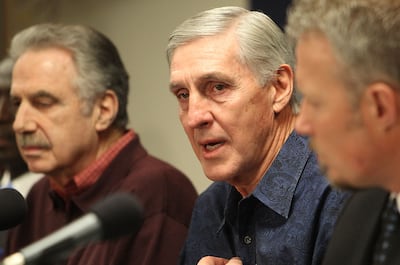
Believe it or not, it’s been nearly nine years since Hall of Fame coach Jerry Sloan directed traffic and barked orders from the bench. Nine years. Sloan shockingly resigned on Feb. 10, 2011, after a brilliant 23-year run, putting the franchise that enjoyed so much success under him — two Finals runs, 19 playoff appearances, 13 50-win seasons — on a new path that nobody foresaw (including the Deron Williams trade less than two weeks later).
Sports Illustrated’s Ian Thomsen described it as well as anyone: “First Jerry Sloan leaves, now Williams is sent away. For two decades we knew who the Utah Jazz were and what they stood for as a franchise. Now we, and they, can have no idea.”
Eight years later, we have a better idea, but it’s been quite a ride since then, including a 25-win season and two surprise second-round playoff appearances.
Remember when Utah and BYU were not only archrivals but also conference foes — and, sorry blue-clad readers, when the Cougars used to occasionally beat the Utes in football?
That entangled relationship changed for good — some might argue it changed for the worse — on June 17, 2010, when the Pac-10 Conference invited Utah to its expansion party with Colorado. The Utes and Buffaloes began play in the rebranded Pac-12 in the 2011-12 season.
And BYU?
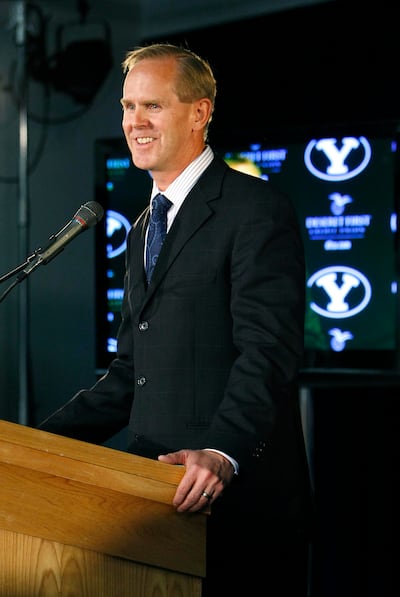
After the rumor mill spun away (momentarily) from Big 12 Conference inclusion, the Cougars decided to forge their own path. Like Utah, they left the Mountain West Conference in the past, but BYU declared its independence in football on Sept. 1, 2010, and began playing its own schedule with its own ESPN/BYUtv-centered TV deal in the fall of 2011. BYU joined the West Coast Conference for the majority of its other sports.
Nothing has been the same since.
And things have continued to evolve for the state’s three most prominent sports programs.
Sloan’s departure paved the way for a decade of change for the Jazz. Williams, their franchise player, was quickly jettisoned to New Jersey shortly after he played a role in the beloved 23-year coach’s departure. Not long after, longtime general manager Kevin O’Connor handed the reins over to Dennis Lindsey in August 2012. The new Jazz GM then parted ways with Sloan’s protege and replacement, Tyrone Corbin, and hired his own guy, the well-traveled Quin Snyder.
Acquiring Snyder, whose rich basketball pedigree includes a whole lot of Duke along with stops around the world, the Jazz struck gold twice while mining Denver for nuggets of potential. Lindsey’s first steal of a deal with Denver came in 2013 and gave the team a franchise cornerstone in 7-foot-1 French center Rudy Gobert, who has blossomed into the stingiest defender in the world after slipping to No. 27 (sound familiar?) in the first round.
Four years later, the Jazz lucked their way into another franchise pillar to complement the Stifle Tower. The timing couldn’t have been more ideal, either. The extremely athletic Donovan Mitchell soared into Jazz fans’ hearts just as Utah’s NBA community had been devastated. That same summer — on the cursed Fourth of July 2017 (or blessed, depending on your viewpoint) — Gordon Hayward bolted for Boston and into the tender care of his college coach, Brad Stevens, leaving Utah (very momentarily) without an experienced, gifted scorer.
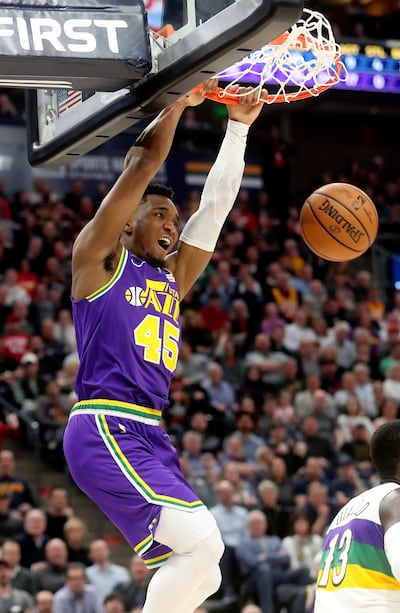
Mitchell burst onto the scene and soothed Jazz fans’ hearts after they’d been broken by Hayward, a player who’d grown into an All-Star in front of an adoring fanbase’s eyes over a seven-year period.
And here the completely retooled Jazz are at the end of the decade, just as much of a Western Conference power as they were at the end of the ‘Aughts with D-Will and Sloan at the helm. Even better, their coach is in his early 50s and their best players have yet to reach the prime of their careers and want to stay in Utah to win championships together.
Imagine for a moment, however, that Sloan doesn’t quit midseason after getting into an argument during the Chicago Bulls game against Williams, that his faithful sidekick Phil Johnson replaces him at the end of that season or the next, that the Jazz don’t get rid of talented-but-disgruntled All-Star point guard (Williams), that the Tyrone Corbin rebuilding project never happens — or at least not until years later — and that O’Connor decides to extend his career a bit longer with his old-school buddies and Dennis Lindsey remains in San Antonio. Jazz fans might currently be grumpy about some big French dude that blocks a bunch of their shots and they might be envious somebody else snagged a high-flying dunker, explosive scorer and all-around good guy from Louisville. They might not have burned, tossed, donated or tucked away their No. 20 jerseys, either.
On the gridiron, Utah suffered through some lean years in the Pac-12 while Ute coach Kyle Whittingham and longtime athletics director Dr. Chris Hill tried to elevate their football program to a Power Five level in all aspects — from roster depth to elite facilities to consistent good results.
The fact that Utah went from a team that struggled with three consecutive losing seasons in Pac-12 play to become a conference power that has won at least a piece of the South Division three times and has been to consecutive championship games is a testament to Whittingham’s dedication and drive.
In the early years, Utah’s rivals liked to call it the Pac-10.2, jokingly trying to demean the Utes and Buffs. Utah has upped its game and status to the point where it’s now a pigskin powerhouse — and not simply because of a once-in-a-decade-or-so run. The talent, work effort, consistency and results — even if not always perfect (see: the Pac-12 Championship game) — are just expected.
Another thing that’s come to be expected?
Beating BYU.
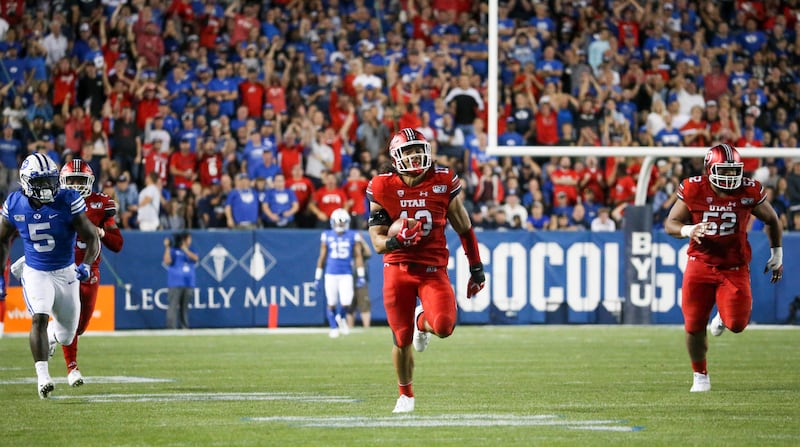
Though the Utes entered the decade having lost three of four to its southernly rival, Utah has now reeled off nine consecutive victories over BYU. The games are usually nail-biters, but they’ve all gone the Utes’ way for the past decade.
Unfortunately for BYU, those head-to-head results against its biggest rival offer tangible evidence that the Cougars are being left behind in the marquee sport for these two institutions that were tied at the hip for oh-so-long before the Pac-12 scooped up Swoop & Co. That’s not to say the Cougars will never beat the Utes again on the gridiron, of course. But Utah now has Power Five funds, not to mention talent, that gives the Salt Lake City school founded by the Provo university’s namesake a huge advantage moving forward.
The fact that they were in the College Football Playoff and Rose Bowl contention until the last moment and that there is now some disappointment around Ute Nation because Utah is in the Alamo Bowl, considered one of the top bowls outside of the New Year’s Day bowls, shows how far they’ve come.
BYU, which has struggled to elevate its performance in recent years, has its work cut out for well-liked coach Kalani Sitake, who replaced the successful-but-quirky Bronco Mendenhall in 2016 after he left for Virginia. The Cougars do seem more visible at times with their independent schedule and TV deal than the Pac-12 Network-buried Utes, often being placed on one of the ESPN channels, but for now that is one of the only advantages BYU has over its brothers to the north.
BYU can only hope things shift in a positive direction in the 2020s as they did for the Utes in the 2010s.
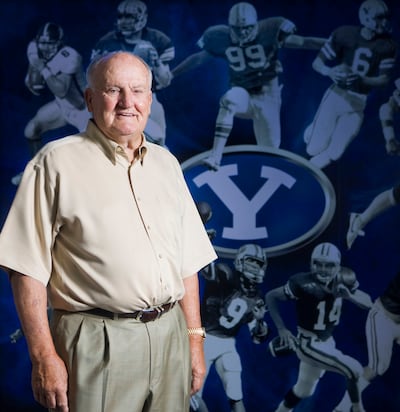
The toughest moment for BYU football — and perhaps all of Utah sports — was the passing of legendary coach and human being LaVell Edwards on Dec. 29, 2016. Another iconic coach Ladell Andersen, who coached the Cougars, Aggies, Utah Stars (ABA) and Utes (assistant), passed away exactly three years later.
Others who passed away included Utah State star and NFL Hall of Famer Merlin Olsen (2010), golf legend Billy Casper (2015), boxing pioneer Gene Fullmer (2015), rodeo all-around champion cowboy and Hall of Famer Lewis Feild (2016) and bobsledding Olympic gold medalist Steve Holcomb (2017).
Also, Rocky Mountain Raceways ended its run in 2018 while Miller Motorsports Park changed its focus in 2015 from hosting a variety of motorsports competitions to a corporate events facility.
The Utes’ basketball program, on the other hand, hasn’t enjoyed the same success as the football counterparts in recent years. But since replacing now-Chicago Bulls coach Jim Boylen early in the decade up on The Hill, former Jazz forward Larry Krystkowiak has had some bright spots intermingled with some dim years in the Pac-12. The Runnin’ Utes, who’ve been decimated by transfers over the past few years, are trending in a positive direction with a roster full of runnin’ youths.
If nothing else, the Utes, who start two sophomores and three freshmen, broke the Kentucky curse by beating the Wildcats for the first time in 43 years during their 9-3 non-conference schedule. That was a fun way to sorta end (we’ll let them forget the San Diego State debacle) a decade that included a Sweet 16 appearance (2015), an NIT Championship game showing (2018) and three consecutive first-round picks in Delon Wright (20th, 2015), Jakob Poeltl (ninth, 2016) and Kyle Kuzma (27th, 2017). Now the Utes just need to make the NCAA Tournament a habit after only making two appearances in the Big Dance all decade.
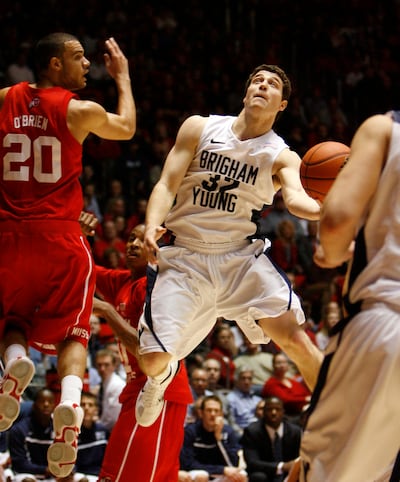
The 2010s would be incomplete without taking a stroll through the part of memory lane that features the fever-pitched phenomenon known as Jimmermania. That swept the nation in first half of the decade as sharpshooting guard Jimmer Fredette awed onlookers with a proclivity for swishing shots from waaaaay behind the 3-point line and for putting a lot of points on the scoreboard to BYU’s benefit (ask New Mexico, which gave up 52 points, and Utah, which saw him drop a Huntsman Center record 47 in 2011). The Jimmer, as he was often referred to, became a cultural sports icon, even getting fun shoutouts from Kevin Durant, who tweeted out that he was “the best scorer in the world,” and then-U.S. president Barack Obama, who credited the Cougar hotshot for being “unbelievable.”
Big man Brandon Davies’ suspension derailed BYU’s hopes in Jimmer’s final season, which ended in the Sweet 16. The Cougars were regulars in the NCAAs in the first half of the 2010s, but new coach Mark Pope has the challenge of getting the WCC school team (that often plays third fiddle in a two-fiddle conference to Gonzaga and St. Mary’s) into the March Madness scene again for the first time since 2015. Pope, of course, replaced Dave Rose, who retired after a solid 15-year stint that included 14 straight 20-plus win seasons and a successful fight against cancer.
Though Fredette never did take the NBA over by storm — like he has the NCAA, the G-League, China and Europe — a Utah hoopster from his era has developed into one of the elite point guards in the world. Point guard Damian Lillard averaged 24.5 points his senior season at Weber State en route to becoming the No. 6 overall pick of the 2012 draft and the 2013 Rookie of the Year. He’s averaged 23.5 points and 6.3 assists for the Portland Trail Blazers and has been named an NBA All-Star four times.
Jimmer was fun. Dame was the future.
Then again, West High’s Tony Finau (16th ranked golfer in world), former Utah State football player Bobby Wagner (Seattle Seahawks’ All-Pro linebacker), Salt Lake City’s Nathan Chen (two-time world champion figure skater) and ex-BYU runner Jared Ward (top American finisher at New York Marathon) can make a similar claim in their respective sports.
Sports fans on Twitter were asked to share their opinions on the most defining moments in Utah sports over the past decade:
“Bronco leaving for UVA. “Watershed moment for BYU in a bad way.” — @clarkamundson
“Game 3 OKC was the game of the decade for me. Just having the Jazz claw their way back into the playoffs sans Hayward, get an emerging star, and have a huge home statement win. That crowd was wild.” — @Dustin_Jensen1
“No doubt that Utah entering the PAC10/12 is probably the defining sports moment for both Utah and BYU. Has anything been as much of a disruptive force in the history of college sports in Utah?” — @UteBeliever
“Is there a defining moment for Utah basketball? I think the lack of any defining moments was the defining factor. So maybe hiring Larry K and paying him ridiculous sums of money only to re-contract him to reward mediocrity.” — @UteBeliever
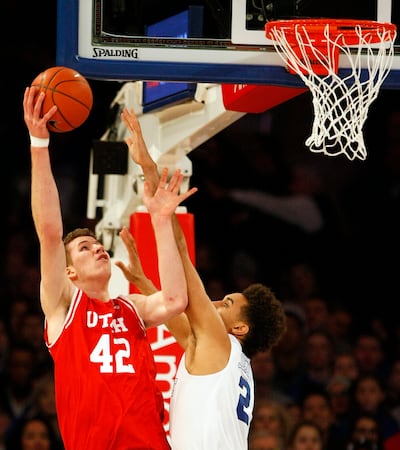
“I’d say for basketball it would either be: Making the Sweet 16 for the umpteenth straight decade. Beating Duke at Madison Square Garden. Having players drafted in the 1st round for 3 straight years. Finally beating Kentucky with one of the youngest teams in the nation.” — @PapaSmurfUTE
“USU football: The 2012 Potato Bowl and WAC Title. USU hoops: MWC reg season and tournament title in Craig Smith’s first year w No 8 seed in the NCAA tourney. Jazz: Ricky Rubio playoff triple double vs Thunder.” — @EarlofHemsley
“UTAH: Joining PAC-12. BYU: Jimmermania. JAZZ: Sloan resigning.” — @josherwalla
“Jimmer is BYUs only defining moment of the decade.” — @BYU2NFL
“Joe Johnson’s game winner vs Clippers, G Hayward leaving... @spidadmitchell making us forget about GH,
@rudygobert27‘s emergence as the defender of the free world and the @nuggets gift wrapping and sending us our core that will one day bring a Chip (championship) to Utah.” — @jmorrisihl
“My SUU picks:
—Finally getting into the Big Sky, then winning the conference football title twice/making first 3 playoff appearances in school history
—Cam Levins winning the 5K & 10K national titles before going to the Olympics
—SUU gym tops then-defending champs UCLA in meet.” — @cwilliamsKSL
“Losing Hayward which was quickly followed Donovan Mitchell being a star. Utes in the playoff conversation multiple times and making it to two conference title games in a row.” — @gothedistance49
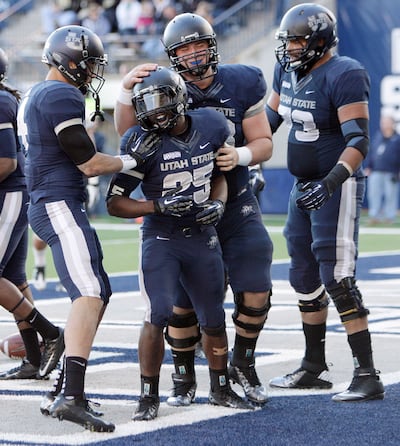
“Utah State winning the WAC in 2012 and beginning to build a culture of winning football in a place that it’s been historically awful.” — @BradenTClark
“BYU: The announcement to go independent or Bronco leaving for UVA (could go either way). Utah: Pac-12. USU: beating BYU in 2010. Jazz: tanking to draft.....Enes Kanter.” — @natedub9
“The emergence of Weber State football as a national powerhouse FCS program with Jay Hill at the helm has to be in there.” — @jeff_criddle
“Donovan Mitchell telling OKC fans we’ll see you next year and then sending them packing to prove it true.” — @gubihero
“For BYU it’s Jimmer and the back-to-back Hail Marys.” — @Cswagdaddy47
“Utah State picked last in MWC preseason in 2018 and going on to win the conference and getting their highest seed ever to the Big Dance.” — @fobby
“Hiring Dennis Lindsey and Quin Snyder.” — @Quinnurp7
“Here’s my hot take of the decade: Joe Williams was the best running back at his peak this decade. (Zack) Moss had best career, but no one dominated like Williams’ final season.” — @MrMonsta913
“The Deron Williams trade/Jerry Sloan resignation. That was the beginning of a completely new era of jazz basketball.” — @bward_34
“We could also look back some day at the Jazz legacy trust in 2017 as the biggest moment of the decade.” — @kevinlarue
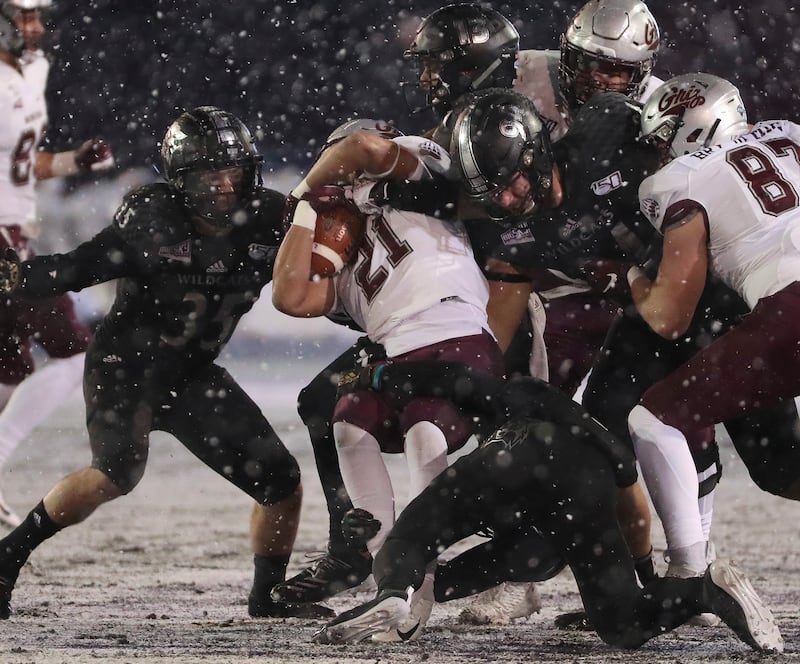
“Definitely having @weberstatefb make it to the semifinals in the #FBS but also having them ranked so high for many years. Also having them win 3 big sky ships! Historical few years for WSU football.” — @kodbeags
“Taysom v. Texas.” — @kirnski
“Utah joining the Pac-12. Utah state joining the MWC. BYU going independent. These changes have totally reshaped the last escape of college (essentially professional) football in the state.” — @danlalli
“The Pac-12 decision by Utah impacted all collegiate sports in thus state. BYU has steadily declined.” — @sportstats1
“The resurgence of Aggie basketball.” — @ScottMuir2
“That time BYU beat the Utes football… wait.” — @Dave78Christens
“Drafting Mitchell for the Jazz. i ain’t been following the college scene long enough to answer that one. Probably (Nick) Rimando’s last season for RSL.” — ClarksonWRLD
“I think (Donovan) Mitchell winning the Slam Dunk Contest (which I know is meaningless), but this helped elevate him to a legit name in the NBA.” — @bradyp81
